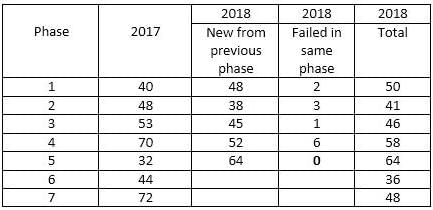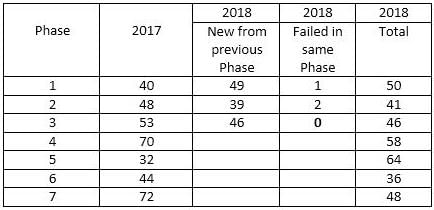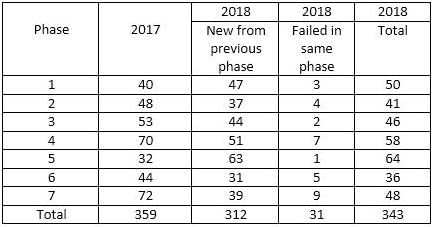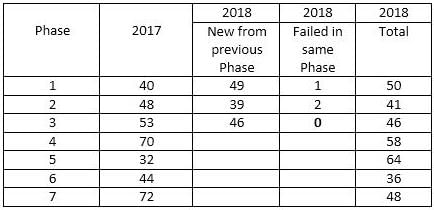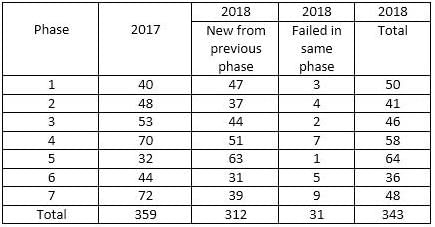This EduRev document offers 15 Multiple Choice Questions (MCQs) from the topic Tables (Level - 3). These questions are of Level - 3 difficulty and will assist you in the preparation of CAT & other MBA exams. You can practice/attempt these CAT Multiple Choice Questions (MCQs) and check the explanations for a better understanding of the topic.
Total income earned by multiplex G on day 1 and day 2 was what percent more than the income earned by multiplex H on day 1?
The following tables give the information about the number of persons who went to see the movie on two different days of the week in different multiplexes of a city:
DAY 1
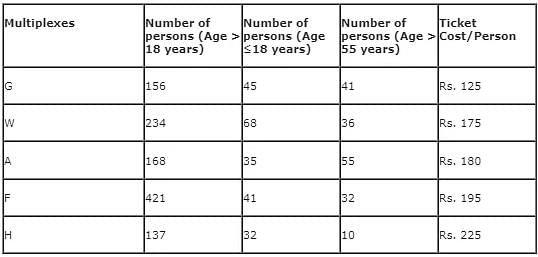
DAY 2
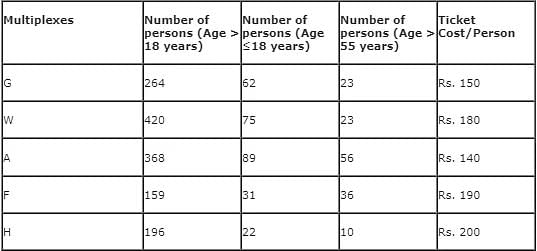
(Assume that income earned by multiplexes is only in the form of tickets.)
If the persons aged 18 years and below were given a discount of 15% and the persons above 55 years of age were given a discount of 21% by all the multiplexes, then what was the total revenue earned by multiplex G on day 1 and day 2, and multiplex H on day 1?
The following tables give the information about the number of persons who went to see the movie on two different days of the week in different multiplexes of a city:
DAY 1
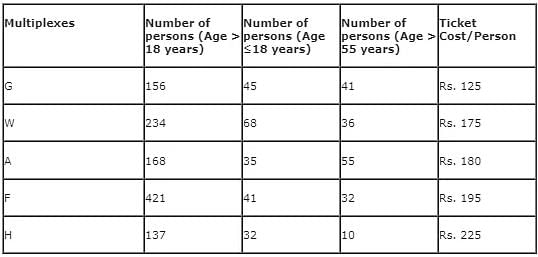
DAY 2
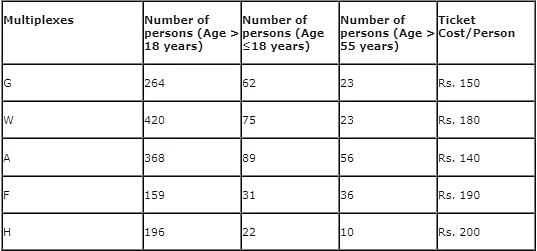
(Assume that income earned by multiplexes is only in the form of tickets.)
Out of the number of persons who went to all the multiplexes on day 1 and day 2, what percent were less than 55 years of age, if only 27 persons aged 55 years went to each of the five multiplexes on each day?
The following tables give the information about the number of persons who went to see the movie on two different days of the week in different multiplexes of a city:
DAY 1
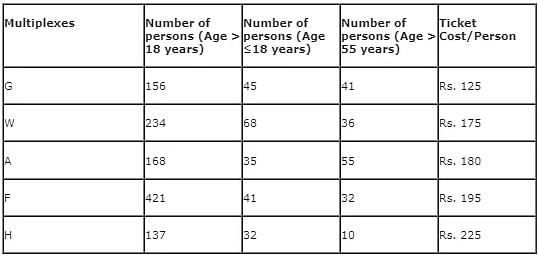
DAY 2
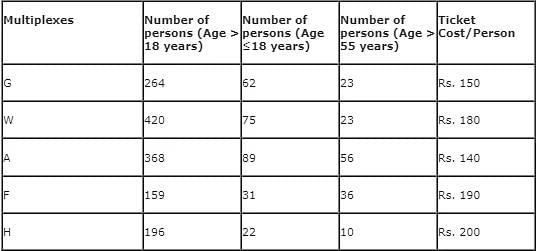
(Assume that income earned by multiplexes is only in the form of tickets.)
What was the total income earned by multiplexes G, H and W on day 2, if there was a discount of 12% to persons not above 18 years of age, and 24% to persons above 55 years of age?
The following tables give the information about the number of persons who went to see the movie on two different days of the week in different multiplexes of a city:
DAY 1
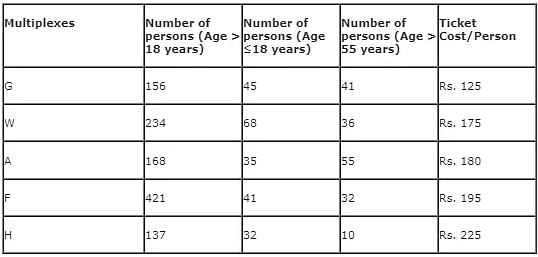
DAY 2
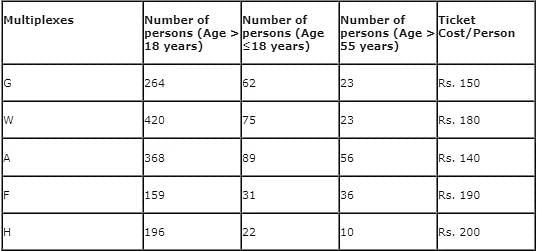
(Assume that income earned by multiplexes is only in the form of tickets.)
If a total of 527 units of Apple were sold in these six months, then how many units of Apple were sold in March?
A laptop manufacturing company manufactures laptops of six different brands- Lenovo, SAMSUNG, Acer, Apple, Sony and HCL. The company gives grades to each brand of laptop based on the number of units (N) of each laptop sold in a month. The following table provides information about the grades given in six different months of the year 2012.
Grade A: 125 > N > 99; Grade B: 85 < N < 100; Grade C: 70 < N < 86; Grade D: 50 < N < 71; Grade E: N < 51

What could have been the maximum possible difference between the number of units of Lenovo and HCL sold in these six months?
A laptop manufacturing company manufactures laptops of six different brands- Lenovo, SAMSUNG, Acer, Apple, Sony and HCL. The company gives grades to each brand of laptop based on the number of units (N) of each laptop sold in a month. The following table provides information about the grades given in six different months of the year 2012.
Grade A: 125 > N > 99; Grade B: 85 < N < 100; Grade C: 70 < N < 86; Grade D: 50 < N < 71; Grade E: N < 51

For which brand of laptop can the difference between the maximum possible total units sold (of all six months) and minimum possible total units sold (of all six months) be the greatest?
A laptop manufacturing company manufactures laptops of six different brands- Lenovo, SAMSUNG, Acer, Apple, Sony and HCL. The company gives grades to each brand of laptop based on the number of units (N) of each laptop sold in a month. The following table provides information about the grades given in six different months of the year 2012.
Grade A: 125 > N > 99; Grade B: 85 < N < 100; Grade C: 70 < N < 86; Grade D: 50 < N < 71; Grade E: N < 51

The minimum cost of transportation from any factory to district PPV is:
There are 9 districts, 6 factories and 7 depots. The factories are QQ, QR, QS, QT, QU and QV. The depots are PP, PQ, PR, PS, PT, PU and PV, and the districts are PPP, PPQ, PPR, PPS, PPT, PPU, PPV, PPW and PPX.
Table (i) shows the cost (in Rs.) of transporting one unit from factory to depot.
Table (ii) shows the cost (in Rs.) of transporting one unit from depot to districts.
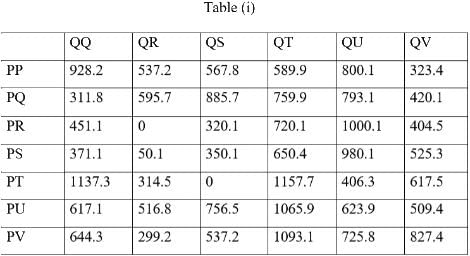
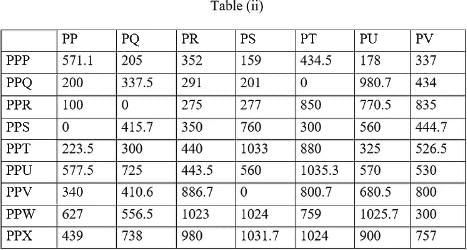
The maximum cost of sending one unit from any factory to any district is:
There are 9 districts, 6 factories and 7 depots. The factories are QQ, QR, QS, QT, QU and QV. The depots are PP, PQ, PR, PS, PT, PU and PV, and the districts are PPP, PPQ, PPR, PPS, PPT, PPU, PPV, PPW and PPX.
Table (i) shows the cost (in Rs.) of transporting one unit from factory to depot.
Table (ii) shows the cost (in Rs.) of transporting one unit from depot to districts.
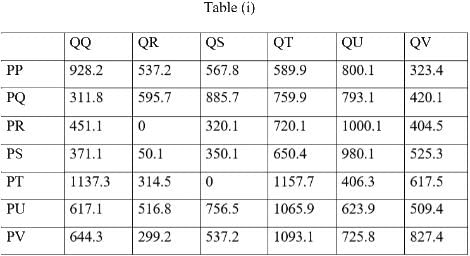
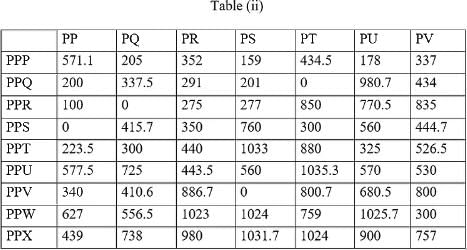
Find the total possible ways in which we can send one unit from any factory to any district.
There are 9 districts, 6 factories and 7 depots. The factories are QQ, QR, QS, QT, QU and QV. The depots are PP, PQ, PR, PS, PT, PU and PV, and the districts are PPP, PPQ, PPR, PPS, PPT, PPU, PPV, PPW and PPX.
Table (i) shows the cost (in Rs.) of transporting one unit from factory to depot.
Table (ii) shows the cost (in Rs.) of transporting one unit from depot to districts.
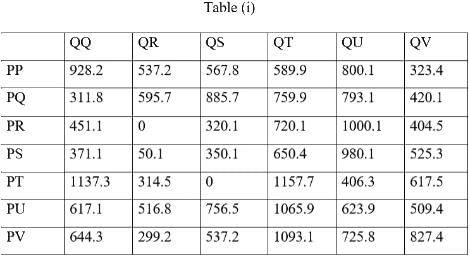
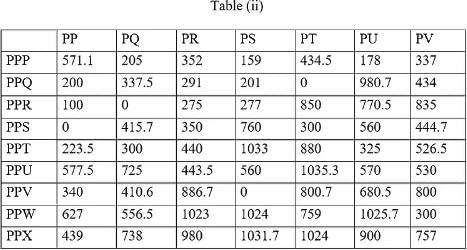
If we send one unit from any factory to any district, then find the minimum cost (in Rs.) for it.
There are 9 districts, 6 factories and 7 depots. The factories are QQ, QR, QS, QT, QU and QV. The depots are PP, PQ, PR, PS, PT, PU and PV, and the districts are PPP, PPQ, PPR, PPS, PPT, PPU, PPV, PPW and PPX.
Table (i) shows the cost (in Rs.) of transporting one unit from factory to depot.
Table (ii) shows the cost (in Rs.) of transporting one unit from depot to districts.
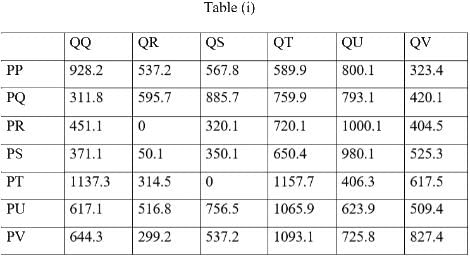
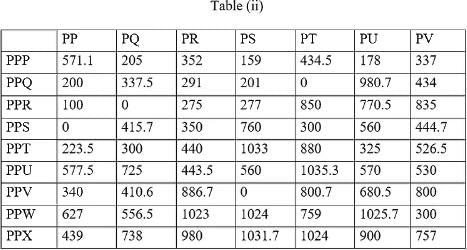
In the year 2017, how many phases had passing percentage more than overall passing percentage of the company?
The number of trainees of DCBA Company from Phase 1 to Phase 7 in the years 2017 and 2018 are tabulated below. Trainees get into Phase 1 and get selected/passed only after Phase 7. No new trainees can enter or leave in any other phases.
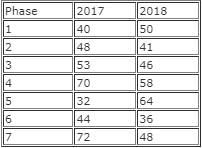
The following facts are known.
1. Trainees get placed in the next phase in the next year only if he/she secures passing marks.
2. The trainees who fails in the examination stays in the same phase for next year.
3. The number of trainees failing in any phase is a distinct single digit natural number.
The total number of trainees who failed in the year 2017 in all phases are
The number of trainees of DCBA Company from Phase 1 to Phase 7 in the years 2017 and 2018 are tabulated below. Trainees get into Phase 1 and get selected/passed only after Phase 7. No new trainees can enter or leave in any other phases.
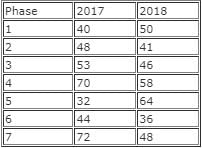
The following facts are known.
1. Trainees get placed in the next phase in the next year only if he/she secures passing marks.
2. The trainees who fails in the examination stays in the same phase for next year.
3. The number of trainees failing in any phase is a distinct single digit natural number.
What is the number of new trainees who joined DCBA Company in the year 2018?
The number of trainees of DCBA Company from Phase 1 to Phase 7 in the years 2017 and 2018 are tabulated below. Trainees get into Phase 1 and get selected/passed only after Phase 7. No new trainees can enter or leave in any other phases.
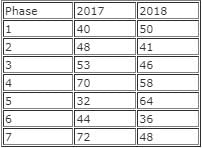
The following facts are known.
1. Trainees get placed in the next phase in the next year only if he/she secures passing marks.
2. The trainees who fails in the examination stays in the same phase for next year.
3. The number of trainees failing in any phase is a distinct single digit natural number.
Find the total number of trainees who passed from DCBA Company in the year 2017.
The number of trainees of DCBA Company from Phase 1 to Phase 7 in the years 2017 and 2018 are tabulated below. Trainees get into Phase 1 and get selected/passed only after Phase 7. No new trainees can enter or leave in any other phases.
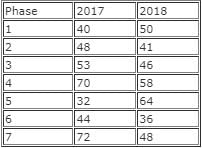
The following facts are known.
1. Trainees get placed in the next phase in the next year only if he/she secures passing marks.
2. The trainees who fails in the examination stays in the same phase for next year.
3. The number of trainees failing in any phase is a distinct single digit natural number.

 x 100 = 80.42%.
x 100 = 80.42%.


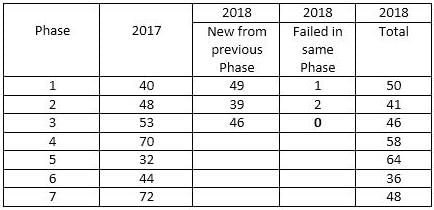
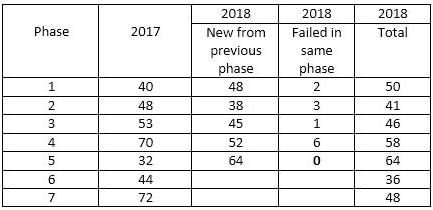

 = 91.365%
= 91.365%
